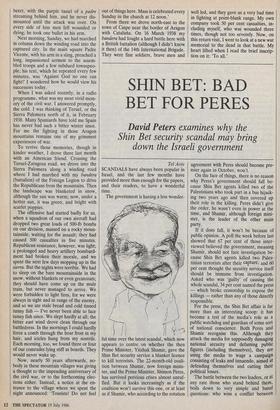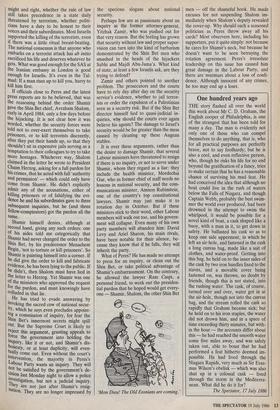SHIN BET: BAD BET FOR PERES
David Peters examines why the
Shin Bet security scandal may bring down the Israeli government
Tel Aviv SCANDALS have always been popular in Israel, and the last few months have provided more than enough for the papers, and their readers, to have a wonderful time.
The government is having a less wonder- ful time over the latest scandal, which now appears to centre on whether the then Prime Minister, Yitzhak Shamir, gave the Shin Bet security service a blanket licence to kill terrorists. The 22-month-old coali- tion between Shamir, now foreign minis- ter, and the Prime Minister, Shimon Peres, has survived previous crises almost unruf- fled. But it looks increasingly as if the coalition won't survive this one, or at least as if Shamir, who according to the rotation agreement with Peres should become pre- mier again in October, won't.
On the face of things, there is no reason why Peres's government should fall be- cause Shin Bet agents killed two of the Palestinians who took part in a bus hijack- ing two years ago and then covered up their role in the killing. Peres didn't give the order, he wasn't even in power at the time, and Shamir, although foreign mini- ster, is the leader of the other main party.
If it does fall, it won't be because of public opinion. A poll the week before last showed that 67 per cent of those inter- viewed believed the government, meaning Shamir, should not face investigation be- cause Shin Bet agents killed two Pales- tinian terrorists after their capture; and 60 per cent thought the security service itself should be immune from investigation. Asked who was 'guilty' of causing the whole scandal, 34 per cent named the press — which broke censorship to expose the killings — rather than any of those directly responsible.
For the press, the Shin Bet affair is far more than an interesting scoop: it has become a test of the media's role as a public watchdog and guardian of some sort of national conscience. Both Peres and Shamir recognise this. Although they attack the media for supposedly damaging national security and defaming public figures (including themselves), they are using the media to wage a campaign consisting of leaks and innuendo, aimed at defending themselves and cutting their political losses.
The battle between the two leaders, or at any rate those who stand behind them, boils down to very simple and banal questions: who wins a conflict between might and right, whether the rule of law still takes precedence in a state daily threatened by terrorism, whether politi- cians have a duty to be honest to their voters and their subordinates. Most Israelis supported the killing of the terrorists, even if there was a little ritual breast-beating. The national consensus is that anyone who embarks on a terrorist attack has ab initio sacrificed his life and deserves whatever he gets. What was good enough for the SAS at the Iranian embassy in London is good enough for Israelis. It's even in the Tal- mud: If a man rises up to kill you, hurry to kill him first.
If officials close to Peres and the latest press reports are to be believed, that was the reasoning behind the order Shamir gave the Shin Bet chief, Avraham Shalom, early in April 1984, only a few days before the hijacking. It is not clear how it was worded, whether the security forces were told not to over-exert themselves to take Prisoners, or to kill terrorists discreetly, after they put their hands up, so that they shouldn't sit in expensive jails serving as a temptation to their colleagues to try to take more hostages. Whichever way, Shalom claimed in the letter he wrote to President Chaim Herzog, asking for a full pardon for his crimes, that he acted with full 'authority and permission' — which could only have come from Shamir. He didn't explicitly admit any of the accusations, either of killing prisoners or of falsifying the evi- dence he and his subordinates gave to three subsequent inquiries, but he (and three fellow-conspirators) got the pardon all the same.
Shamir himself denies, although at second hand, giving any such orders: one of his aides told me categorically that Shamir had never changed the order to the Shin Bet, by his predecessor Menachem Begin, 'not to torture or kill prisoners'. So Shamir is painting himself into a corner. If he did give the order to kill and fabricate evidence, he has been lying to the public. If he didn't, then Shalom must have lied in the letter to Herzog. Yet Shamir was one of the ministers who approved the request for the pardon, and must knowingly have colluded in that lie.
. He has tried to evade answering by invoking the sacred cow of national secur- itY, which he says even precludes appoint- ing a commission of inquiry, for fear the Shin Bet's innermost secrets might spill out. But the Supreme Court is likely to reject this argument, granting appeals to force the government into holding the inquiry, like it or not, and Shamir's dis- honesty, or at least duplicity, will even- tually come out. Even without the court's intervention the majority in Peres's Labour Party wants an inquiry. They will not be satisfied by the government's de- cision last Monday night to allow a police investigation, but not a judicial inquiry. TheY are not just after Shamir's resig- nation. They are no longer impressed by the specious slogans about national security.
Perhaps few are as passionate about an inquiry as the former attorney-general, Yitzhak Zamir, who was pushed out for that very reason. But the feeling has grown that security without law and proper super- vision can turn into the kind of barbarism demonstrated by the Shin Bet men who smashed in the heads of the hijackers Subhi and Majdi Abu-Jama'a. What kind of state, at least a few Israelis ask, are they trying to defend?
Zamir and others pointed to another problem. The prosecutors and the courts have to rely day after day on the security service's evidence, whether to jail terror- ists or order the expulsion of a Palestinian seen as a security risk. But if the Shin Bet director himself lied to quasi-judicial in- quiries, why should the courts ever again believe his agents? The damage to Israel's security would be far greater than the mess caused by cleaning up these Augean stables.
It is over these arguments, rather than the desire to damage Shamir, that several Labour ministers have threatened to resign if there is no inquiry, or not to serve under Shamir, whom they regard as a liar: they include the health minister, Mordechai Gur, who as former chief of staff needs no lessons in national security, and the com- munications minister, Amnon Rubinstein, one of the country's top constitutional lawyers. Shamir may just make it to rotation day in October. But if these ministers stick to their word, other Labour members will walk out too, and his govern- ment will collapse. Even many of his own party members will abandon him: David Levy • and Ariel Sharon, his main rivals, have been notable for their silence, be- cause they know that if he falls, they will inherit the party. What of Peres? He has made no attempt to press for an inquiry, or clean out the Shin Bet, or take political advantage of Shamir's embarrassment. On the contrary, he allowed the lawyer Ram Caspi, a personal friend, to work out the presiden- tial pardon that he hoped would get every- one — Shamir, Shalom, the other Shin Bet `Mon Dieu! The Old Etonians are coming.' men — off the shameful hook. He made excuses for not suspending Shalom im- mediately when Shalom's deputy revealed the cover-up. Why should such a seasoned politician as Peres throw away • all his cards? Most observers here, including his supporters, put it quite simply: not because he cares for Shamir's neck, but because he doesn't want to be seen betraying the rotation agreement. Peres's irresolute leadership on this issue has caused him great damage in the Labour Party, and there are murmurs about a loss of confi- dence. Although innocent of any crimes, he too may end up a loser.



















































 Previous page
Previous page